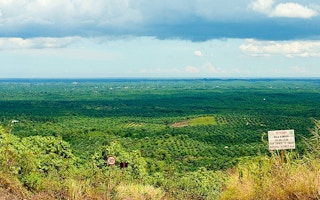The Roundtable on Sustainable Palm Oil (RSPO) has ruled that a unit of Singapore-listed palm oil giant Wilmar had violated indigenous community rights in Indonesia’s West Sumatra region, signalling progress in a two-year long dispute between the company and rights activists.
In a decision announced on February 1, the industry association for sustainable palm oil said that Wilmar-owned PT Permata Hijau Pasaman I (PT PHP1) had not followed the proper legal process for obtaining land from the indigenous Kapa community and beginning to plant oil palm on it.
Based on the advice of an independent consultant, RSPO’s Complaints Panel—a group of NGO and finance sector representatives—recommended that the disputed land should be re-measured for development approval with better community participation, and that PT PHP1 should renegotiate the terms for planting oil palm on the Kapa community land.
The ruling marks an important step in a complaint that the Kapa people, in partnership with international non-government organisation Forest Peoples Programme (FPP), had filed with RSPO in October 2014.
Patrick Anderson, policy advisor, FPP, said in a statement that “this vital judgment from RSPO demonstrates that even the largest companies can’t get away with land grabbing”.
“RSPO has ruled that companies must respect indigenous peoples’ and local communities’ customary rights to land and only operate on their lands with their free, prior and informed consent,” he added.
Responding to the ruling Wilmar said that it “respects the decisions of the RSPO complaints panel and will act accordingly.”
“Wilmar remains fully committed to working with the RSPO and all parties concerned to resolve the case in a transparent and equitable manner,” added the company.
Long-running dispute
In the complaint against Wilmar, filed more than two years ago, the Kapa people and FPP raised an alarm about PT PHP1’s application for a land cultivation certificate—known as a Hak Guna Usaha or HGU—for the right to develop plantations in the community’s customary lands.
The complainants argued that firstly, PT PHP1 had not included the community or been transparent in the process of marking out the land for which it wanted development rights; and second, it did not factor in customary land laws when assessing the land for high conservation value.
Despite this, Indoneisa’s National Land Agency issued a HGU certificate to PT PHP1, giving the company the legal right to develop the land.
Rather than asking PT PHP1 to terminate its operations, the Kapa community asked to negotiate an alternative tenure agreement which did not require them to hand over land management rights to the company, while still allowing them to develop oil palm—a request that was not met.
RSPO responded in March 2015 with a preliminary decision that it was satisfied that PT PHP1 had complied with the law in its HGU application, and added that the indigenous communities should resolve the land boundary conflicts with the government.
This claim was contested by the Kapa community leader, Gampo Alam, who was then jailed for two months in May 2015 on charges that he had misappropriated community funds. This sparked an outcry from FPP, which claimed that Wilmar was behind the arrests, and was using its clout to intimidate and threaten Alam.
Wilmar quickly rejected these allegations, arguing that Alam had been arrested based on a police report filed by his relative, which accused him of misappropriating funds from a smallholder group scheme in the community.
The matter remained unresolved for the next year, though after several meetings, RSPO, Wilmar, and the complainants agreed in early 2016 to engage an independent assessor to resolve the conflicting claims.
In light of the assessor’s recently announced findings, Alam noted that “for the Kapa, our customary land cannot be sold as it is our identity.”
“We hope that Wilmar International will now honour the ruling of the RSPO, and will quickly restore our right to the lands that it took without our consent,” he added.

















